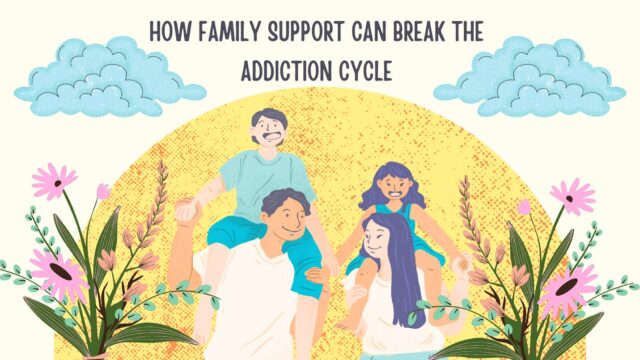
Addiction is a complex disease that impacts millions of individuals and families. The cyclical nature of substance abuse disorders makes overcoming addiction exceptionally challenging. However, through a multi-faceted approach involving professional treatment, community support, policy changes, and a focus on total wellness, breaking free from the addiction cycle is possible.
Portugal saw dramatic drops in problematic drug use, HIV rates, and overdose deaths after decriminalizing personal drug possession and use.
While addiction is somewhat difficult to overcome, recovery is possible through compassionate, evidence-based treatment plans. Resources regarding drugs can help you gain knowledge about their impacts. Though relapse is common, it is possible to achieve lasting sobriety through patient-centered care. There is still more hope for all who struggle with substance abuse if met with understanding people and loved ones around them.
Understanding the Cycle of Addiction

The addiction cycle consists of three main stages – binge/intoxication, withdrawal/negative affect, and anticipation/preoccupation. As substance abuse persists, the cycle becomes more severe and transforms the brain by hijacking its communication pathways.
Numerous case studies reveal the intensification of addiction over time. What may start as recreational or social use can spiral into dependence in a matter of months or years. Understanding the psychology and physiology underlying the addiction cycle is the initial step toward disrupting this repetitive pattern.
Strategies to Break the Addiction Cycle
Once the addiction cycle becomes entrenched, actively implementing strategies to break free from its grasp is essential. This involves identifying personal triggers and high-risk situations to avoid relapse. Enlisting the help of professionals through evidence-based treatment methods can also give individuals the tools to interrupt addictive behaviors.
Both behavioral and pharmacological therapies have proven effective in breaking addiction cycles, although success rates vary based on personalized treatment plans. Thousands of inspirational success stories demonstrate that overcoming substance abuse disorders is achievable through commitment and support.
The Role of Family and Community in Recovery

While professional treatment lays the foundation, ongoing family and community support are integral for maintaining long-term recovery. Research shows family dynamics and communication patterns heavily influence addiction recovery outcomes. Addressed constructively, family relationships can motivate positive change. However, unsupportive home environments often hinder progress.
Likewise, community support systems provide the essential social scaffolding to reinforce sobriety. Peer-support groups and 12-step programs give individuals a sanctuary of understanding to achieve and sustain recovery. For example, Alcoholics Anonymous and Narcotics Anonymous have helped thousands reclaim fulfilling lives in recovery through shared stories and wisdom.
Breaking the Cycle: Understanding and Overcoming Addiction
The Vicious Cycle of Addiction
- Discuss the repetitive nature of addiction cycles.
- Explore how the initial use evolves into dependence and compulsive behavior.
- Highlight the impact on relationships, employment, and overall well-being.
Root Causes and Triggers
- Examine the underlying factors contributing to addiction.
- Explore common triggers that lead individuals back into the cycle.
- Discuss the role of trauma, mental health issues, and environmental influences.
Dual Diagnosis: Substance Abuse and Mental Health
- Highlight the frequent co-occurrence of substance abuse and mental health disorders.
- Explore the complex interplay between addiction and conditions like depression or anxiety.
Breaking Physical Dependency
- Discuss withdrawal symptoms and the challenges of breaking physical dependency.
- Explore medically-assisted treatments and detoxification programs.
- Emphasize the importance of professional guidance during the initial stages.
Psychological Rehabilitation
- Introduce therapeutic approaches for addressing the psychological aspects of addiction.
- Explore the role of counseling, cognitive-behavioral therapy, and support groups.
- Highlight success stories of individuals who have overcome psychological barriers.
Overcoming Stigma and Embracing Change

Societal stigma remains a significant barrier that prevents individuals from seeking treatment for substance abuse disorders. Negative stereotypes, prejudice, and discrimination keep the cycle of addiction spinning by deterring people from getting help.
Embracing change by openly discussing addiction, showcasing recovery success stories, and advocating for marginalized groups can help reduce stigma over time. Ultimately, summoning the courage and resilience to acknowledge the problem, reach out for support, and commit to the recovery process brings the greatest chance of breaking the addiction cycle.
Holistic Approaches to Sustaining Recovery
Once achieved, maintaining recovery requires a holistic approach addressing physical, mental, and spiritual health. Experts recommend integrating both conventional and alternative wellness strategies into daily life.
For instance, practices like mindfulness, meditation, yoga, art therapy, music therapy and pet therapy heal the mind-body connection strained by addiction. Adopting balanced nutrition, frequent exercise, productive daily routines and meaningful hobbies help cement long-term sobriety. Ongoing talk therapy and 12-step meeting participation also provide continuity of care.
Legal and Policy Aspects of Addiction
Laws and public policies also significantly influence addiction cycles. Research shows policies emphasizing harm reduction over punishment increase treatment uptake and improve outcomes. Regions adopting decriminalization, increased funding, and integrated care models have achieved huge success in combating addiction epidemics.
Shifting resources towards healthcare instead of incarceration allowed for a wider availability of free, voluntary treatment options. Replicating such legal frameworks and treatment models demonstrates that policy-level changes positively disrupt the cycles of addiction worldwide.

Frequently Asked Questions
How does one identify when they are in the cycle of addiction?
Paying attention to internal cues like cravings and external cues like negative life consequences provides insights into addiction patterns. Track your substance use to identify a potential cycle of intoxication, withdrawal, and preoccupation. If use becomes compulsive despite escalating costs to relationships, work/school, finances, or mental and physical health, you may be trapped in the addiction cycle.
What are the most effective therapies for breaking the addiction cycle?
Research shows integrated treatment plans including FDA-approved medications, evidence-based counseling approaches like cognitive behavioral therapy and motivational interviewing, 12-step peer support group participation, plus alternative wellness practices demonstrate the highest rates of long-term recovery success.
How can families support a member trying to break the addiction cycle?
Educate yourself about addiction, encourage your loved one to pursue professional treatment, provide emotional support by listening non-judgmentally, identify your own boundary needs, build a relapse prevention plan together, help explore meaningful activities/hobbies to fill time, and collaboratively design a sober social support network.
How does addiction develop?

Addiction can develop from a combination of factors. These factors include genetic predisposition, environmental influences, personal behavior, and the chemical properties of the substance being used. Early use, mental health disorders, and social environment can also play significant roles.
Why is it so hard to quit drugs or alcohol?
Quitting is difficult due to the physical and psychological dependencies that develop. The brain’s reward system is altered, leading to intense cravings and withdrawal symptoms. Emotional and environmental triggers can also make sobriety challenging.
What treatment options are available for addiction?
Treatment options include detoxification, medication-assisted treatment, behavioral therapies, support groups, and rehabilitation programs. The best approach often involves a combination of these methods. It is tailored to the individual’s needs.
Is medication necessary for addiction treatment?
Medication can be an essential part of treatment. This is especially true for opioid, alcohol, and nicotine addiction. It helps manage withdrawal symptoms and cravings. This makes it easier to focus on recovery and behavioral therapies.
How can I support a loved one struggling with addiction?

You can show support through understanding, compassion, and encouraging treatment. If appropriate, take part in therapy sessions and avoid judgment. Setting boundaries and seeking support for yourself are also important.
Can someone recover from addiction on their own?
While some manage to recover without formal treatment, professional help increases the chances of sustained recovery. It does this by providing tools, support, and strategies to handle cravings and triggers.
What is the role of detox in addiction treatment?
Detox is the first step in addiction treatment. It aims to manage withdrawal symptoms when someone stops taking drugs or alcohol. It’s most effective when followed by further treatment and support.
How long does addiction treatment take?
The duration of addiction treatment varies depending on the individual’s needs, type of addiction, and treatment plan. It can range from 30 days to over a year. Long-term follow-up care is crucial for recovery.
What is relapse, and why does it happen?
Relapse is the return to drug use after an attempt to stop. It’s a common part of the recovery process. Stress, environmental cues, and social networks often trigger it. They’re linked to substance use.
How can relapse be prevented?
Relapse prevention includes ongoing therapy and medication. It also includes lifestyle changes, stress management techniques, and strong support networks. Identifying and avoiding triggers is also crucial.
What are the long-term effects of addiction on health?
Long-term effects can include heart disease, liver damage, respiratory issues, mental health disorders, and increased risk of infectious diseases. The extent of damage often depends on the substance used and the duration of addiction.
How can society reduce drug and alcohol addiction?
Efforts can include increasing awareness and education. They can also involve improving access to treatment, supporting research, and reducing stigma. They can also include implementing policies that address root causes like poverty, trauma, and mental health issues.

Conclusion
Recovery from addiction isn’t just a possibility; it’s a journey of profound transformation. As we navigate the intricate cycles of substance abuse, it’s crucial to recognize that hope is the beacon guiding us toward healing.
The power of overcoming addiction begins with breaking the silence. Open conversations, sharing experiences, and dispelling stigma are the initial steps toward a brighter future. Recovery is a testament to personal empowerment. Recognizing the cycle of addiction is an act of courage, and each decision to seek help is a stride toward reclaiming control.









